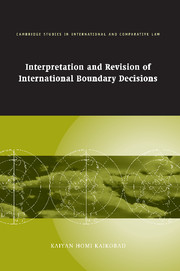Book contents
- Frontmatter
- Contents
- List of maps
- Preface
- Acknowledgments
- Table of cases
- List of abbreviations
- Part I Introduction
- Part II The settlement of territorial and boundary disputes
- Part III Judicial remedies: interpretation
- Part IV Judicial remedies: revision
- Part V Conclusions
- 12 Conclusions
- Select bibliography
- Index
- CAMBRIDGE STUDIES IN INTERNATIONAL AND COMPARATIVE LAW
12 - Conclusions
Published online by Cambridge University Press: 14 September 2009
- Frontmatter
- Contents
- List of maps
- Preface
- Acknowledgments
- Table of cases
- List of abbreviations
- Part I Introduction
- Part II The settlement of territorial and boundary disputes
- Part III Judicial remedies: interpretation
- Part IV Judicial remedies: revision
- Part V Conclusions
- 12 Conclusions
- Select bibliography
- Index
- CAMBRIDGE STUDIES IN INTERNATIONAL AND COMPARATIVE LAW
Summary
By way of concluding remarks, it will be interesting to consider a few salient features of these two judicial remedies. In the first place, the remedies of interpretation and revision have a basic, practical usefulness when seen at the immediate, bilateral level. It can hardly be doubted that, for litigating States, these two processes are invaluable insofar as they provide opportunities for remedying difficulties which may have crept into the decision. An examination of the cases showed that the difficulties which can bedevil a State after the decision has been rendered are many and varied, and that their manifestations can range from simple, uncontroversial, typographical errors in the judgment or award, to the admission of hitherto undiscovered facts of crucial importance, with disputes, including the choice of a boundary watershed or the location of a branch or source of a frontier river, intermingling between them.
The sources of these difficulties are equally manifold, and include the lack of a proper geographical survey and the existence of an ambiguous passage or passages in the decision; difficulties may also arise as a consequence of technical miscalculations in the dispositif. Apart from the mundane political and procedural worries they may bring in their train, applications for interpretation and revision will nearly always involve issues associated with the loss of territory.
- Type
- Chapter
- Information
- Interpretation and Revision of International Boundary Decisions , pp. 325 - 339Publisher: Cambridge University PressPrint publication year: 2007

